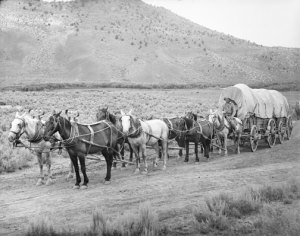In my last post, I wrote about my move to California. I wondered if my tendency to take off for new adventures has anything to do with my family’s recent history as immigrants.
Now, I’ve spent some time in the corporate world, and as such, I despise phrases like “paradigm shift” or “new dynamic.” Still, it seems clear that something is up.
Americans are moving less than ever before, a result of the cataclysm we jokingly call our economy. It’s been almost half a century since so few of us changed addresses. Just over one percent of us moved to a new state, which as the New York Times points out, “suggests that Americans were unable or unwilling to follow any job opportunities that may have existed around the country, as they have in the past. And the lack of movement… could have an impact on the economy, reducing the economic activity generated by moves.”
I’ve done my part by selling my house (yes, in this market) packing up, and road-tripping two thousand miles. Granted, my previous employer’s decision to downsize me made this choice easier (thanks for the catalyst, guys!). However, it seemed clear to my wife and me that that we needed to shake things up. So we moved.

You’ll have to ask me in a few years whether this was the right call or not. But I’m optimistic.
Many Americans are not similarly upbeat, of course, or they lack the resources to hit the road. Still, many of us who could move – and in some cases, should move – are staying put. According to the Times, this shows that “the U.S. population, often thought of as the most mobile in the developed world, seems to have been stopped dead in its tracks due a confluence of constraints posed by a tough economic spell.”
I don’t want to extol Thomas Friedman as some kind of wise soothsayer (I’ve got some issues with the guy), but much of his “world is flat” thesis sounds like the simple acknowledgement that Americans whose families go back generations still have to be willing to adapt, because everyone else – whether Mexican immigrants, first-generation Indians, or some other demographic – is willing to do so.
It’s true that immigration is at its lowest point in a decade, another sign of economic meltdown. Still, immigrants (by their very nature) are more willing to ditch their old life and tackle the newest challenge, and they will be the first ones to do it again when the economy picks up.
Meanwhile, we may be exiting the period of history when Americans had the luxury of saying, “This is where I grew up, and this is where my family is, so I’m not budging.” That will no longer be the intrinsic justification it once was.
Americans obviously have the capability to change. People rolled west in the Great Depression. And California didn’t become the most populous state just because of Mexican immigrants (although in the right-wing mind, that’s the sole reason the state has any problems whatsoever).
Even if we stay put, however, we have to accept that our hometowns are inevitably changing in front of us, proving once more that we live in not only a place but a time. Acknowledging this fact makes it less scary to consider going where the jobs and experiences and challenges are.
One thing I love about moving to California is that – despite the crowded cities and governmental bankruptcy and earthquakes and shallowness – the place represents change. But I had to come here to discover that.




